Vodafone UK Confirm 1Gbps FTTH Network Live in Cambridge
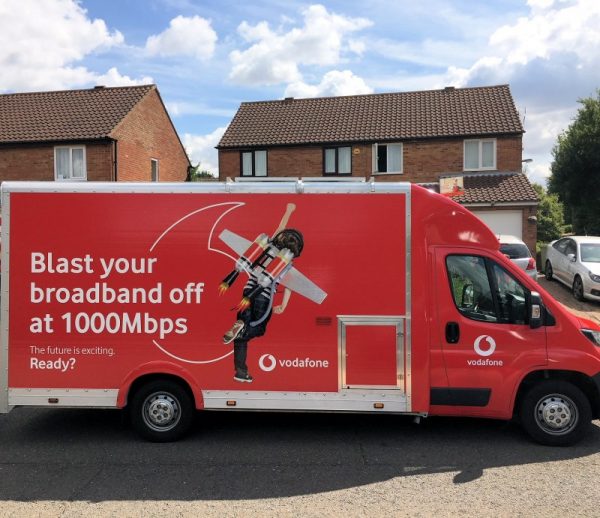
UK ISP Vodafone has today finally confirmed our report from last month (here), which revealed that their new 1Gbps capable Fibre-to-the-Home (FTTH) broadband network with Cityfibre had gone live in the city of Cambridge. The deployment is costing £20m and will ultimately cover around 60,000 local premises.
The new network, which is due to complete by the end of 2021, reflects a huge expansion beyond Cityfibre’s existing 44km long metro Dark Fibre platform in the city that was previously only used to serve local businesses and public sector sites in limited areas.
By comparison the new FTTH extension has now officially started to go live for customers in the Chesterton and Kings Hedges areas of the city. Subscribers can of course take a service via Vodafone’s related Gigafast Broadband packages (these cost from just £28 per month for 200Mbps and speeds go up to 900Mbps).
Advertisement
In terms of build progress, Cityfibre expects to have made their new network available to around 4,500 local homes by the end of Q1 2020.
Max Taylor, Vodafone UK’s Consumer Director, said:
“The introduction of full fibre broadband to Cambridge provides residents, students and the growing number of technology start-ups with ultra-fast and reliable digital connectivity. We are working with our infrastructure partner, CityFibre, to connect up homes across the city with the aim to offer more than 4,500 households access to the service within the first three months of 2020.”
The development means that Cambridge can now join Aberdeen, Bournemouth, Coventry, Huddersfield, Milton Keynes, Peterborough and Stirling as some of the first Phase One cities where Cityfibre’s new FTTH network has gone live for customers. All of this forms part of their wider £2.5bn plan to reach 1 million premises across the UK by the end of 2021 (Phase One) and then 5 million by the end of 2025 (here).
Cityfibre’s biggest rival in the city will be Virgin Media, which can already cover nearly 90% of premises (a similar coverage level to Cityfibre’s target) and is due to start offering 1Gbps speeds by 2021 (here). Meanwhile Openreach’s FTTP network reaches about 6% of local premises and their 330Mbps capable hybrid fibre G.fast technology covers a third of premises.
The city is also home to another full fibre ISP called Cambridge Fibre but we don’t know much about their build progress or forward plans.
Advertisement
Mark is a professional technology writer, IT consultant and computer engineer from Dorset (England), he also founded ISPreview in 1999 and enjoys analysing the latest telecoms and broadband developments. Find me on X (Twitter), Mastodon, Facebook, BlueSky, Threads.net and Linkedin.
« Virgin Media Get New CFO and Deputy CEO Ahead of Big Change
Ruling by EU Court Adviser May Hamper UK Internet Snooping »






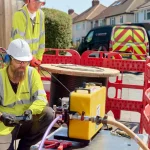
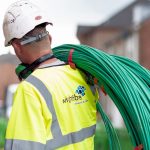

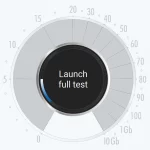



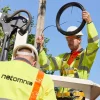
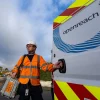






































Of course Virgin can’t compete with Gigafast Broadband on speeds as Gigafast is symmetrical, on Virgins M200 service you only get 20Meg upload, but Gigafast Broadband 200 product beats that upload speed by a factor of 10 proving 200Meg. Even Virgins Gig1 Fibre product can only provide ~50M uploads, pretty pathetic really for a service that is calling itself 1Gig.
Vodafone/Gigafast is what you call a real uncompromising fibre optic service, even Openreach’s FTTP starts looking like a hack in comparison as their 200 speed tier is only configured with ~20 upload as well.
Arguments of course is people don’t need these high upload speeds, but why not give it to them anyway? 1Gig is being offered and you can argue people don’t need these speeds either. Obviously the main problem is the technology used by Openreach and Virgin struggle with upload speeds. In time this should be resolved, but companies like Gigafast need to turn up the marketing and make it clear how their service is better. It wasn’t that long ago that even a 100 symmetrical service being offered for around £30 a month would have been an impossible dream, and is still in the vast majority of the UK.
While it is true that FTTP and FTTH can support full symmetrical, the are technologies in the exchanges that do not have the capacity to support it, and they strongly believe domestic consumers in the masses don’t need it, so their focus is on downloads, not uploads.
The other issue is they do not want to give us full symmetrical due to the fact they sell leased lines, and lower contention ratio connections to businesses at a high premium. The idea is always to have consumers wanting the best, and those needing the best, paying a hefty premium for it.
Not sure you appreciate how hard they’re pushing the network to offer symmetrical gigabit. A single customer is using basically all the capacity shared with the neighbours on their own.
Openreach are playing it safe and guarantee their upload speeds. Vodafone cannot.
The argument of “people don’t need it” even existed before DSL was rolled out, the people that spout it are perhaps the most ignorant I’ve encountered, apportioning based on need is socialism/communism.
Good use case for 1Gbps upload is it makes cloud backup of your entire PC/household PC network possible, increasing data security.
Isn’t the gigafast title a bit misleading if their fastest package is only 900 MB/S? Surely the speeds should be OVER 1000 MB/S before they can make this claim?
Most Gigabit ISPs have to say 900Mbps due to the advertising rules that require the display of average speeds as at peak time. You do raise an interesting question though about “gigabit” and “gigafast” terminology, but I suspect that the ASA won’t care unless a provider’s related packages are falling way.. short of such speeds. The fact they clearly label the speeds of each package also leaves little room for confusion.
Overheads.
It can be hard to obtain more than 900mbit on a 1000mbit connection, on a internal network, never mind the internet. In order to achieve the full 1 gig you need perfect conditions, this applies to internal and external networks. You would need a RAM to RAM, RAID to RAID, or SSD to SSD, to get close to those speeds, and that’s assuming the switches, and routers, have little load. Most internal 1gig networks run at between 850-980 mbit.
Its not hard it is basic maths due to the layer model
Gigabit Ethernet once you allow for overheads of the protocols has a maximum of 940 Mbps
Spinning rust of reasonable quality is fine for gigabit.
https://hdd.userbenchmark.com/
You were fine with just overheads. Ethernet frame + IP header + TCP header ensures you’re never going to see a gigabit on a speed test.
I find it frustrating that areas that already have some of the highest average speeds are the first areas to be ‘upgraded’ to Gigabit potential infrastructure. Meanwhile, just outside of these areas are residents who are struggling to browse for jobs because someone else in the house is watching a streaming service.
The bandwidth used by these streaming services appear to be increasing at a rate that is isolating more and more areas that are being left behind. I think it’s fantastic for residents that have access to all this infrastructure but soon the minimum acceptable speeds from Ofcom will be twice what they are now as corporations move to take advantage of these cities that have a lot of bandwidth further isolating the rest.
Is there a chance the UK will always be in a deficit for bandwidth?
I think in the case of Vodafone/Cityfibre, it’s using backbones that already exist, so it’s the quick win low hanging fruit that’s enabling them to muscle in.
At least where I am (Peterborough), Cityfibre laid a business fibre network years ago that’s now being used for the FTTP project (that’s my understanding anyhow).
I appreciate it must be frustrating.
I find it frustrating I live in the largest city in Europe without a mass transit system other than buses but it is what it is. There will always be better infrastructure in some areas than others, even when FTTP is ubiquitous.
Danny, Simon, CarlT,
Impressive. Will Vodafone actually provide FTTH/FTTP via Openreach as well? There are areas just outside their CityFibre projects which have been struggling for years. Openreach have finally upgraded several areas to FTTP (after no fibre and abysmal 1-2Mb speeds for over 10 years).
Is it possible that from March 2020, Vodafone will offer an “Ultrafast” lineup via Openreach FTTP (albeit with non symmetrical download and upload) to match BT’s offering? So instead of the VG 200, 500, 900, they’d have an “Ultrafast” (not Gigafast) Openreach offering of perhaps 330, 500, 900?
Right now the Vodafone website (unlike BT) only offers you the Superfast VDSL (non FTTP Openrach) or Gigafast (certain areas only). BT offers Superfast (copper/FTTC) and Ultrafast. The day that Vodafone and others join BT offering FTTP on Openreach would be a massive boon to consumer choice and competition. The Vodafone price for symmetrical speeds is cheaper than the BT FTTP prices! Even the Vodafone Superfast prices are cheaper (even though speeds are the same).
@CarlT
I always thought you were UK based. I’d love to come to your city = assuming you know that title is held by Istanbul ?
Doesn’t Istanbul straddle both Europe and Asia, David?
I stand corrected depending on your definition.
The basic fact is that all these claims may prove misleading. GPON is Asymmetrical in principle. All the providers have different business models and there are many varying factors such as the backhaul capacity, the age of the equipment. how it is configured and the splitter ratios. Our broadband usage is primarily consumption rather than creation and that is how it is forecast to be except the up/down ratios a will get smaller as our behaviour change. The basic splitter ratio being adopted appears to be 1:32 for residential and 1:8 for business. If everyone on a particular splitter consumes the maximum then there will be contention.
Cityfibre may say Giga, 900Mb, symmetrical down as their service but the reality is that they cannot guarantee that for those paying for the higher product unless they restrict the ratio (as they do for business) or restrict the uptake. Unrestricted use may lead to abuse or bad behaviour so businesses will not want this to affect their service and for the business products via GPON will typically contract for a given service at say 300Mb symmetrical although they may be able to burst to higher speeds it will not fall below that contracted.
Currently for Cityfibre the take-up and their network provision appears to allow their residential package to burst to 1 gig but as more customers come on board there will be contention. All ISPs work on the basis that we will invariably purchase more broadband capacity than we will ever use, packages will be sold in a mix of speeds and that the general mix of use and users means that contention will not be a major problem. All OR and VM are doing is ensuring that the probability of contention is reduced within their current kit/provision and as they get new kit they can reconsider the settings they use.
Only time will tell whether Cityfibre need to introduce restrictions (if not already there) and whether advertising the headline speed, an average or the guaranteed speed is appropriate.
If someone at home is managing to require a burst to 1gig, i will eat my hat.
There is zero chance in hell you will get even half way there even whilst trying too. Its only speed tests that will show your speed, everything else is limited. Literally nobody is serving data that fast.
Also remember if your downloading data, you are most likely going to limited by your drives write speed as well.
It will be years and years before they have to worry about it.
@ianh
How about when you download a OS X or MS update for your computer?
How about when you set up your new iPhone laptop and do a full download of the last backup and then an upload to iCloud of the image?
How about uploading a 4K video to Vimeo?
These are real examples of flat out usage where I can honestly say I have seen 100Mb + usage (yes big M)
@ianh
Yes it is highly unlikely today but as I said ISPs work on the basis that we do not use the capacity we purchase and there is a mixed product and usage. However the issue here is that the actual network providers have to support multiple speed products. It could be that there is only only 30% take-up and they all subscribe to a 40Mb ISP service. However equally in some streets they could get a full 32 ISP Giga users and overtime users will move in overbuild areas and expectations will continue to increase. In addition there is always the possibility of a data based business using consumer products (claimed by expenses vs VAT benefit) or media designers working from home. We also have bad practice like multiple full back ups rather than incremental or running a server in a back bedroom. There will also be the same busy times as usual.
My view is that whether it is 4G, 5G, FTTC, FTTB or FTTH the advertising should be truthful and realistic.
The upload is far more risky than the download.
The scenarios you describe are why capacity planning is a thing. There are many potential choke points on the network.
Awesome as symmetrical gigabit is I’d not want to provision it on GPON.
As far as saturating capacity goes saturating upload is far easier than saturating download. P2P networks remain a thing. Get a nice popular one, seed yourself senseless with it, leave it uncapped, you can peg a gigabit for days on end.
Actually I should also mention they don’t have to sell based on a guaranteed speed. They sell based on a peak time median as those are the rules.
If you’re expecting the advertising to guarantee speeds, absolutely guarantee them, the products will be very different.
Which technology used for FTTH – GPON, GEPON, XG-PON, 10G-EPON, “dark” fiber from node to each home …?
Cityfibre/Vodafone is GPON today; they could replace with XG-PON or another technology later, using the same fibres in the ground.
Impressive. Will Vodafone actually provide FTTH/FTTP via Openreach as well? There are areas just outside their CityFibre projects which have been struggling for years. Openreach have finally upgraded several areas to FTTP.
Is it possible that from March 2020, Vodafone will offer an “Ultrafast” lineup via Openreach FTTP (albeit with non symmetrical download and upload) to match BT’s offering? So instead of the VG 200, 500, 900, they’d have a 330, 500, 900 offering?
Right now the Vodafone website (unlike BT) only offers you the Superfast VDSL (non FTTP Openrach) or Gigafast (certain areas only). The day that Vodafone and others join BT offering FTTP on Openreach would be a massive boon to consumer choice and competition. The Vodafone price for symmetrical speeds is cheaper than the BT FTTP prices!
Enter ‘Vodafone openreach’ into the ‘search isp news’ box on this site and find out…
I currently have the Vodafone Gigafast in aberdeen with 540mbps average on the 500mbps plan
I’m actually connected at 1gbps from my modem.
https://ibb.co/GMGBf1v
I’m on Virgin with a constant 551mbps on their 500 plan – what’s your point? Or are you saying you can’t afford 1000 so you are on 500 instead? Which is a point as I have no idea the prices!